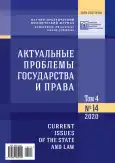INVOLUNTARY MEDICAL INTERVENTION: EXPERIENCE OF JUDICIAL AUTHORIZATION
- Authors: Buraschnickova N.A.1
-
Affiliations:
- Tambov Regional Court
- Issue: Vol 4, No 14 (2020)
- Pages: 241-249
- Section: Процессуальное право
- URL: https://journal-vniispk.ru/2587-9340/article/view/304130
- ID: 304130
Cite item
Abstract
We analyze the features of the legal regulation of the issues of providing medical care in an involuntary manner in connection with infectious diseases that pose a danger to society. We formulate the grounds for compulsory application of medical interventions to people with or suspected of having COVID-19. We substantiate the need for involuntary use of various types of medical intervention in situations of mass spread of dangerous infectious diseases. We propose a mechanism for compulsory implementation of medical intervention measures, which involves mandatory judicial control over the legality, necessity and proportionality of their application. It is substantiated that in an epidemic or pandemic, all medical interventions that are authorized to use by health care professionals should be supported by an enforcement mechanism. In addition, we assume that the court can authorize not only compulsory hospitalization, which is currently explicitly specified in the legislation, but also compulsory medical examination (inspection), restrictive quarantine measures (isolation), preventive vaccination in a situation of infectious diseases mass spread. We justify the possible allocation of a single section in the Code of Administrative Judicial Procedure of the Russian Federation on judicial control over various types of involuntary medical intervention.
About the authors
Nataliya Anatolevna Buraschnickova
Tambov Regional Court
Author for correspondence.
Email: buraschnickova.n@yandex.ru
ORCID iD: 0000-0002-1723-4538
Deputy Chairman, Chairman of the Judicial Board on Administrative Cases
Russian Federation, 8 Kommunalnaya St., Tambov 392000, Russian FederationReferences
- Kamyu A. Chuma [The Plague]. Moscow, AST Publ., 2020, 384 p. (In Russian).
Supplementary files








